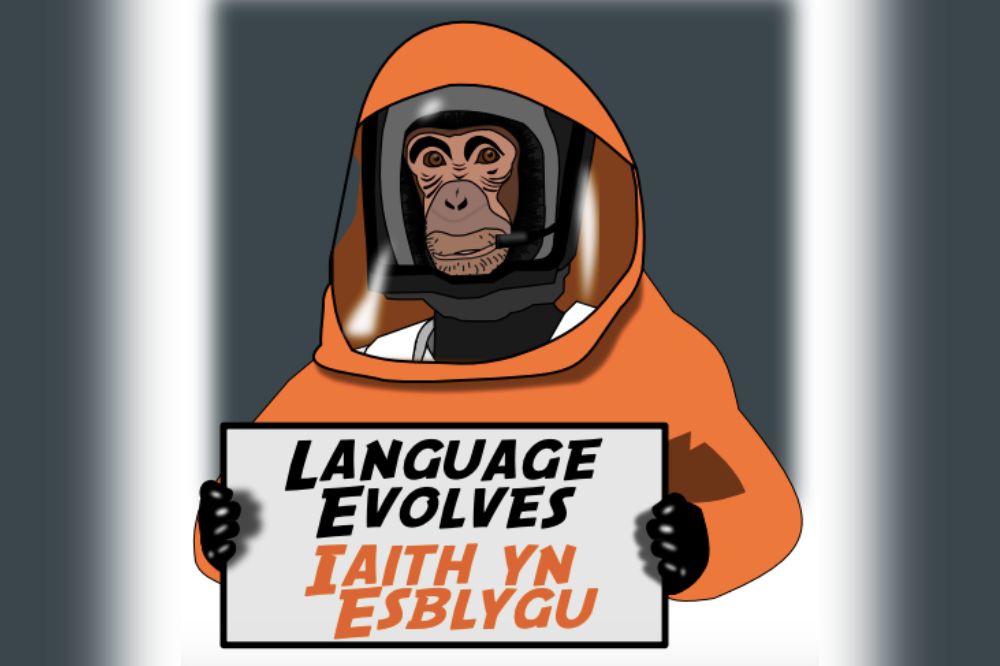Authors and academics join forces to reimagine the past and future of language in Wales

Seán Roberts, Hannah Little, Kateryna Krykoniuk, Cardiff University
What shapes a language’s story? 60 years after Saunders Lewis warned of the death of the Welsh language, its story is more hopeful.
The number of speakers is growing, with almost half of children 3-15 years old being able to speak Welsh.
Welsh is protected by law, with the government aiming at a million speakers by 2050.
By now, Welsh is in the top 10% of the largest languages of the world and can be learned and used through a number of new digital technologies.
So, maybe the old story of an ancient language in a bitter struggle with its enemies does not fit anymore.
New stories
Although discrimination still happens, and it’s important to push back against this, there’s room for other stories.
What is the relationship between Welsh and the other languages of our multilingual world? What will Welsh be like in the future?
As a group of researchers who study language, we wanted to communicate what we know about the evolution of language to promote new stories.
We’ve been running workshops for authors and a short story competition. The aim of the project is to give authors new ideas.
And since one of the strengths of fantasy and speculative fiction is showing our culture in a new light, we’ve been inspired by the stories in turn.

The winner of this year’s contest, judged by Wales’s first National Poet Gwyneth Lewis, is Y Ddwyleg by Olivia Cowhig.
The story is published this month in Gwyllion Magazine and asks the question: what if there was more than one Welsh language?
The story is set in an alternative past where an independent Wales has protected spoken Welsh. Under its wing, a Welsh Sign Language has evolved.
This isn’t just a copy of another sign language, but one that has been shaped by Welsh culture and grammar. For example, the sign for “please” involves pointing to the eyes, because the Welsh phrase is “os gwelwch yn dda” (literally “if you see well”), and there’s a single sign for the letter ‘th’, since this is a single letter in the Welsh alphabet.
In the story, the sign language is being threatened by misguided language policies.
Although these policies still surface today against real sign languages, tying the fate of a Welsh sign language to Wales’s past presents a challenge to the way we tend to think about Welsh: is it time that we saw the fight for the future of Welsh as part of a wider fight for the rights of many other languages that are less fortunate?
Another way
The second story is set in the future. Arianwen by Sarah McCreadie includes yet another way of seeing Welsh: as an object of desire.
Sarah presents the challenge of learning the language as a romantic adventure, quite different from old stories based around a solemn duty.
But it resonates clearly with a new generation of learners, from Wales and beyond, who want to learn the language through new technologies for fun.
Through Sarah’s story, it’s possible to a possible future for Welsh – one where people want to use the language as part of their social life and creative expression.
In the past or the future, the message of the stories are clear – the story of language in Wales is in our hands.
Y Ddwyleg and Arianwen are published this month in Gwyllion Magazine. You can find out more about our Language Evolves project by visiting our website.
Support our Nation today
For the price of a cup of coffee a month you can help us create an independent, not-for-profit, national news service for the people of Wales, by the people of Wales.





Too true, languages evolve. If we want one million Welsh language speakers by 2050 something radical needs to be done. It is time we stopped teaching the mutations in Welsh language classes – make it easier to learn the language. I know this is heresy to some people – languages evolve, the Welsh language needs to speed-up its evolution!
Languages do evolve – the mutation system of Welsh used to have fewer paradigms, and there’s some evidence that younger generations are more variable in their use of mutation. The Welsh of the future might sound quite different. But the mutation system is well adapted to the language, and it seems counter productive to view Welsh as ‘lagging behind’ other languages without this system. Removing mutations might make the language easier to learn, but it would also probably make it harder to speak. And trying to force a change in the language rarely works. What we do have control over… Read more »